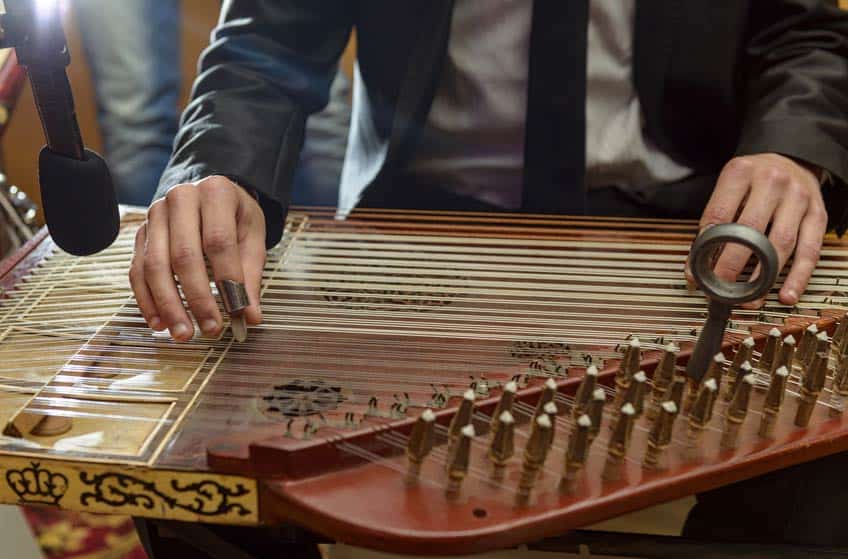Music Career Finder
Start Here:
Ethnomusicologist
Career Overview
Ethnomusicologists go into the field to learn about the musical practices of different groups, writing academic studies that frame musical traditions and movements through a sociocultural lens.
Alternate Titles
Comparative Musicologist, Musicologist, Folklorist, Music Historian
Avg. Salary
$95,624 per year1
Salary Range
$114K-$213K per year1

How To Become an Ethnomusicologist
- Ethnomusicologists study the cultural, social, and historical contexts of different styles of music
- Most people who pursue ethnomusicology end up as professors at a university
- This career requires years of schooling and will probably involve earning a Ph.D.
- The typical work schedule involves a mixture of 9-to-5 work life with some traveling abroad
- The average salary of an ethnomusicologist is about $95,624 per year and can range from $114,000 to $213,000 per year
- Career Description
- Salary
- Career Outlook
- Career Path
- Experience & Skills
- Education & Training
- How to Get Started
- Additional Resources
- Sources
- References
Career Description
An ethnomusicologist studies the music of different cultures, usually in cultural, social, and historical contexts.
What Does an Ethnomusicologist Do?
Professor Adriana Helbig of the University of Pittsburgh says it’s the study of “how people use music to create community and how they relate to each other on the physical, emotional, and national level.”
Ethnomusicologists research music of different cultures and times, both by reading and by spending time in said cultures. They also teach students, present work to peers, write and submit grants, and write research projects.
A Day In the Life of an Ethnomusicologist
Helbig said her day usually looks like this:
- Research (usually between 5 a.m. and 8 a.m.)
- Teach two classes a day
- Conduct fieldwork during the summer
Salary
The average salary of an ethnomusicologist is about $95,624 per year. The salary range of an ethnomusicologist is about $114,000 to $213,0001.
How Does an Ethnomusicologist Make Money?
Ethnomusicologists can make money in several different ways, oftentimes combining multiple streams of revenue.
They might be an assistant professor at a university and collaborate with a museum on the side. Or they might work at a research institute while also archiving recordings and documents for a library.
Most of the time, you would get a position with a salary and benefits, especially because a career ethnomusicologist needs to earn at least a bachelor’s degree.
Hey, what do you think about trying our new Music Career HelperMusic Career Helper really quick? It’s totally free and could help get your career moving fast! Give it a try. It’s totally free and you have nothing to lose.
Career Outlook
Usually, an ethnomusicologist will teach during the school year, with occasional overseas trips to teach study-abroad courses.
Other than that, they have regular office hours and teach a certain number of classes during the day or night.
Schedules also vary based on where the ethnomusicologist’s main area of study is located. This is because they need to communicate with people around the world, so often have to get up very early or stay up very late.
Career Path
Here are the most common positions an ethnomusicologist could get…
Professor at a University
Most ethnomusicologists become professors at a university.
If you want to pursue this career, you would probably start as an adjunct professor, moving on to become visiting professor or visiting assistant professor before landing an assistant professor position and getting on a tenure track.
Helbig became an adjunct professor the last year of her graduate school program. From there, she became an assistant professor as a sabbatical replacement. Finally, she ended up teaching at the University of Pittsburgh for six years before getting on a tenure track.
Research Institute
This would involve researching the cultures that developed different kinds of music, and working alongside anthropologists and sociologists.
Museums
Ethnomusicologists can curate exhibits at museums. They are the ones who know about the history and culture of music, so museums tap their expertise to help create the presentations.
Libraries
Many libraries and various archives house recordings and written materials about music history and its culture. As an ethnomusicologist, you could help preserve and organize these historical music recordings and materials.
Non-Governmental Organizations (NGOs)
As an ethnomusicologist working at an NGO, you would help document, protect, and promote endangered musical traditions.
Experience & Skills
Here are the main experiences and skills you should develop to help you in your career as an ethnomusicologist…
Study Abroad
Helbig said you should “study abroad so you know your comfort levels.”
Even as undergraduates, the connections that aspiring ethnomusicologists make on these programs are key because as in all music careers, it’s who you know. And these are the connections people will use to help their research projects.
Traveling experience ranks highly for a slightly different reason. Part of Helbig’s job as an Assistant Professor is planning and leading groups of students on study abroad.
“When I do my study abroad programs, I’m drawing on how much time I need,” she said. “…How long it takes to find an underground scene versus talking to producers. Everything you see builds on everything else.”
Learn To Market Yourself
Helbig said the typical ethnomusicologist position has 50-80 applicants, and every one of them has a Ph.D. and is qualified.
“A lot of it is learning how to market yourself,” she said. “You need to know more than just your subfield these days so you can be hired to teach other classes.”
Learn Other Languages
Helbig said it’s important to study a language that isn’t French, German, or Spanish.
Choose “something that relates to your own experiences but isn’t a colonial language.”
She uses the example that in Russia, everyone speaks Russian, yet there are also many other tongues specific to minority cultural groups. Speaking these languages will help researchers communicate, navigate their new location, and show respect and a serious interest in the culture.
Participate In Other Cultures
Although this is an academic field of study, aspiring ethnomusicologists must not adhere to the buttoned-up Professor stereotype.
While learning about other cultures, you might hear things like “take your shoes off, we’re going to learn some Irish dancing.” So you have to be excited to “participate in the music and how that music is used in the culture,” Helbig said.
Education & Training
Building a career as an ethnomusicologist requires going to school for multiple years.
Ethnomusicologist Degree
A Ph.D. is essential to becoming an ethnomusicologist professor.
Ethnomusicology master degree programs are available, but they have almost no likelihood of being funded, and will not allow a candidate to advance as far as possible in this career.
“You need this degree in music to make these connections,” Helbig said, explaining that the connections you’ll make during research and studying abroad will stay with you throughout your career, opening new doors to study in different areas of the world.
She stresses that attending an undergraduate program with world music classes is important.
“If you only go to a school that talks about Bach and Beethoven, it’s not going to give you a sense of what you can do,” she said.
In addition to schoolwork, you need to be motivated to attend regional conferences, join ethnomusicology organizations, and get to know the people in your chosen field to get exposure to more opportunities.
She advises you start looking at grad school programs during your junior year, and have at least two solid pieces of writing “that show your chops.”
Then make connections with people.
How to Get Started
- Immerse yourself in global music and culture. Start by exploring music from all over the world – and really listen to it. Swap out your usual playlist for international genres, attend local cultural festivals or concerts, and even try learning a traditional instrument if you can. The goal is to expose your ears (and heart) to as many musical styles and traditions as possible. The more you fall in love with diverse sounds and rhythms, the more fuel you’ll have for your ethnomusicology journey. (Plus, it’s a pretty fun “homework” assignment!)
- Lay your educational groundwork. No surprise: ethnomusicology lives at the intersection of music and anthropology, so you’ll want to build a base in both. In high school and college, take music classes (like music theory, history, or world music ensembles) and courses in social studies (think anthropology, sociology, cultural studies). Read up on topics that fascinate you – whether it’s how K-Pop took over the globe or the role of music in ritual ceremonies. Getting this knowledge under your belt early will make you conversant in the language of music and culture. Trust me, a little theory now will go a long way when you’re deep in a remote village recording songs later!
- Learn new languages (and keep those ears open). Being able to say “hello” (and more) in another language is a superpower in ethnomusicology. If you know you love, say, Indonesian gamelan music or Brazilian samba, start learning the language associated with that culture. It’ll help you connect with people when you do fieldwork and show respect for their world. At the same time, keep listening broadly to different music traditions — not as background noise, but actively. Pay attention to instruments, rhythms, and lyrics. Seasoned ethnomusicologists will tell you this combination of language skills and active listening is key. “Have every kind of musical experience you possibly can, in as many styles as you can. Above all, listen to as much music as you can.” – Dr. Suzel Reily, Ethnomusicologist
- Step into the field (start local). You don’t need a plane ticket to start doing fieldwork – there’s plenty to discover in your own backyard. Seek out local communities or cultural centers and see if you can observe or participate in their musical events. Is there a powwow, an Afro-Cuban drumming workshop, or an Irish céilí dance night in your town? Go check it out! When you do, be respectful and curious: ask questions (when appropriate), learn the etiquette (maybe you’ll be asked to take off your shoes and dance, who knows!), and if possible, record your experiences in a journal or on your phone. These mini fieldwork adventures will teach you how to interact with musicians and communities, an essential skill for an ethnomusicologist. Plus, you might stumble on a style of music that becomes your passion.
- Find mentors and join the community. It really helps to know people who are already doing what you want to do. Don’t be shy about reaching out to teachers, professors, or local musicians who are involved in world music or cultural research. Join organizations like the Society for Ethnomusicology or attend public lectures and workshops if you find any. You can also connect on social media or forums (there are ethnomusicology groups out there) to ask questions and get advice. Many professionals are happy to help a keen newcomer. In fact, one globe-trotting Ethnomusicologist, Aaron Appleton, suggests you start by making connections in your area: “Try searching out national cultural councils and organizations, or just go to local universities and meet professors in the music or anthropology department.” – Aaron Appleton, field-recording EthnomusicologistNetworking might feel awkward at first, but it’s how you’ll hear about cool opportunities (and it’s how people will eventually hear about you!).
- Consider a degree in ethnomusicology (yes, more school). If you’re serious about making this a career, plan on some higher education. Many Ethnomusicologists earn a bachelor’s in music, anthropology, or a related field, and then go on to do a master’s or Ph.D. in ethnomusicology. Grad school is where you really dive deep into research: you’ll learn how to conduct fieldwork, analyze music, and probably pick a specialty (like a region or a particular music culture) to focus on. It’s a big commitment – we’re talking a few years of intense study – but it can be hugely rewarding. You’ll want to pick a graduate program that fits your interests (hint: find a professor whose work makes you go “wow” and apply to study with them). Also, look for programs that offer funding or assistantships, because nobody likes gigantic student loans. And don’t worry if a Ph.D. sounds daunting right now; one step at a time. A master’s can be a great stepping stone, and you can decide later if the Ph.D. (and the title of Doctor of Musicology!) is for you.
- Build hands-on experience wherever you can. Alongside your studies, grab every chance to get real-world experience. This could mean helping a professor with their research, interning at a museum or music archive, or volunteering to record audio at cultural events. Maybe you assist in digitizing a folk music collection at your local library, or you help organize a world music festival in your city. If teaching is your thing, you might tutor kids in music or even serve as a Teaching Assistant for a world music class during college. Each of these experiences will beef up your resume and teach you practical skills – like how to conduct an interview, operate recording gear in the field, or curate a playlist for an exhibit. It’s okay if some gigs are unpaid or side hustles at first; you’re investing in experience. (Pro tip: keep a portfolio or blog of your projects – it shows future employers or grad schools what you’ve been up to and how serious you are.)
- Land that first ethnomusicology gig (and keep going). After all this prep, you’re ready to actually get paid for your ethnomusicology chops! Early-career jobs might not be glamorously titled “Ethnomusicologist” right away, but they draw on the same skills. You could snag a role as a research assistant on a grant project, a coordinator for a cultural nonprofit, or an adjunct instructor teaching a “World Music 101” course at a community college. You might even create your own opportunity – for example, start a world music podcast or consulting service and monetize it. The key is to put yourself out there and apply to anything that can get your foot in the door. Don’t be discouraged if it’s a patchwork of part-time gigs at first; that’s pretty normal in this field. As you build a name and a network, bigger opportunities (like full-time museum jobs, university positions, or international research projects) will come. Remember, every expert Ethnomusicologist started with that first local gig. Celebrate it – you’ve officially begun your journey! Now keep learning, keep connecting, and let your curiosity guide you to the next chapter of your career.
Additional Resources
With yearly conferences held in North America, The Society for Ethnomusicology is an excellent resource.
The International Council for Traditional Music holds conferences across the world.
Google Scholar is a great resource for online research.
Sources

Adriana Helbig
Adriana Helbig is an Assistant Professor of Applied Ethnomusicology and an affiliated faculty member in Cultural Studies, Women’s Studies, Global Studies, and part of the Center for Russian and East European Studies at the University of Pittsburgh. A member of the graduate faculty, she teaches courses on global hip-hop, world music, music, gender, and sexuality, music and technology, and cultural policy. She is an alumna of Columbia University.
She is also founder and director of the Carpathian Music Ensemble, a student performance group that specializes in the music of Eastern Europe, including Jewish klezmer and Gypsy music. She is the recipient of numerous grants and research fellowships from the National Endowment for the Humanities, American Councils for International Education, IREX, and Fulbright.
She is the co-author, with Oksana Buranbaeva and Vanja Mladineo, of The Culture and Customs of Ukraine (Greenwood Press, 2009). Her book Hip-Hop Ukraine: Music, Race, and African Migration was published in May 2014 by Indiana University Press. Helbig has been a guest lecturer at the University of Maryland. For more of her thoughts on Ukraniain hip-hop, check out this article from PRI.
References
- 1. "Ethnomusicology Salaries". Glassdoor. published: June 6, 2024. retrieved on: Nov 18, 2024


